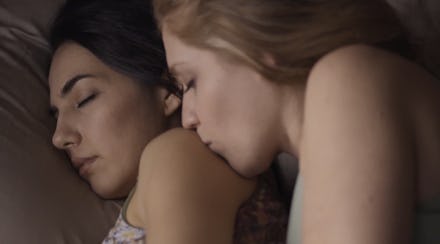This Achingly Beautiful Ode to Marriage Equality Will Actually Make You Cry

The Supreme Court will decide Monday whether to hear cases about same-sex couples' marriage rights from Utah, Oklahoma, Virginia, Indiana, and Wisconsin. As the highest court in the land ponders yet another important step towards marriage equality in America, it's important to take a step back and remember why the movement actually matters.
Inaugural Poet Richard Blanco, who gained fame after being the first openly Latino, gay man to have his work chosen for a presidential swearing-in ceremony, has released a new poem and accompanying video for the 10th anniversary of marriage equality in Massachusetts. Freedom to Marry, a national marriage equality movement founded in 2003, commissioned the poem by Blanco for the anniversary titled "Until We Could" — and it's a doozy.
"I knew it then," in that room where we found for the first time our eye," the poem begins. Set to the music, male and female voices read what can only be described as a tremendously beautiful — if slightly idealistic — example of the power of romantic love, of all sexual orientations. But even more than that, "Until We Could" serves as a powerful ode to all those who fought so hard so that gay and lesbian Americans could have their love recognized alongside their straight brothers and sisters.
The talented Blanco, who has been with his partner for 14 years, has not been married yet but plans to in the near future. He told the Daily Beast he was honored to write the piece, which is partly "based on personal experience, so I’m retracing the love I have for my own partner, and my own sense of marriage."
I caught the sunlight pining through the shears, traveling millions of dark miles simply to graze your skin as I did that first dawn I studied you sleeping beside me: Yes I counted your eyelashes, read your dreams like butterflies flitting underneath your eyelids, ready to flutter into the room. Yes, I praised you like a majestic creature my god forgot to create, till that morning of you suddenly tamed in my arms, first for me to see, name you mine. Yes to the rise and fall of your body breathing, your every exhaled a breath I took in as my own wanting to keep even the air between us as one.
Directed by David Lowery and Yen Tan, with voiceovers by actors Ben Foster and Robin Wright (who are engaged to each other) as well as other couples, the film features a wide range of young and old couples, in good times and in bad.
Image Credit: YouTube
While lyrically beautiful, the poem's strongest section may be towards the end, when it turns its attention outward. Blanco builds to a powerful crescendo as he recites some of the country's recent advancements in terms of marriage equality.
"When the fiery kick lines and fires were set for us by your founding mother-fathers at Stonewall, we first spoke defiance. When we paraded glitter, leather, and rainbows made human, our word became pride down every city street saying ... Let us in, we said: Love is love, proclaimed it into all eyes that would listen at every door that would open, until noes and maybes turned into yeses, town by town, city by city, state by state, understanding us and the woman who dared say enough until the gravel struck into law what we always knew."
To date, marriage equality is legal in 19 states and the District of Columbia, with many other states appealing the same-sex marriage ban. Texas, where the video was filmed, is currently one of those states that appealed to have the ban repealed and is awaiting scheduling for a new court date.
"The direction and pace of the marriage decisions — their sheer velocity — is unlike any other debate in modern politics or law," BuzzFeed's Chris Geidner wrote. "The space of a little more than a year, the timeline for any sort of legal resolution of the issue has completely shifted."
Ultimately, Blanco said he hopes the poem endures as a lasting testament to all those who have worked for equality — as well as those who will grow up to reap the benefits of such efforts.
"That's one of the things I hope for it — that it can be used at gay weddings, for all generations," Blanco told the Daily Beast. "I hope the poem reminds young people about the work their mamas and papas did for equality to get them to this point, that they realize the struggle isn’t over, that they must keep carrying the torch for those who aren’t as lucky, who cannot say 'I do.'"
Image Credit: YouTube